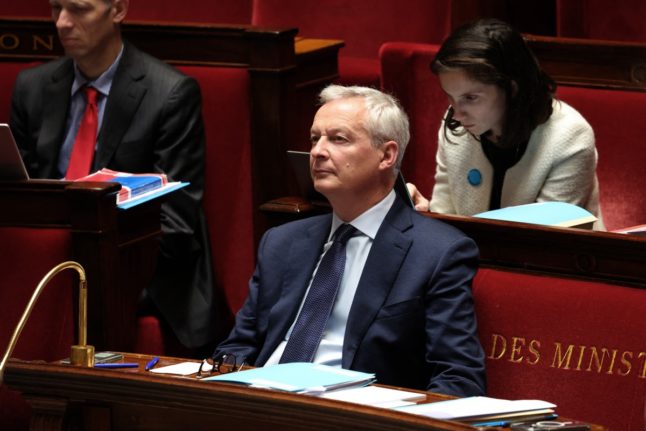The projection based on projected results at 8pm indicated that Emmanuel Macron has won the second round.
The final result will be released by the Interior Ministry on Monday morning, but the initial projection – which is extrapolated from the first 100, 200 or 400 votes cast at polling stations which are specially selected to represent different demographics, geographical areas and political strongholds – are generally very accurate.
READ ALSO How does France produce such early election results?
The rest of the evening will be given over to victory speeches, concession speeches, much political analysis and – in the two candidates’ camps – probably quite a lot of drinking to either celebrate victory or drown sorrows.
But once Monday morning dawns we get back to serious politics and a momentous few days.
What happens this week?
On Wednesday Laurent Fabius, head of the Constitutional Council, will proclaim the official results.
The Interior Ministry’s count released on Monday is the de facto result, but over the next two days the Constitutional Council verifies the vote, reads the reports of its delegates and deals with any disputes that have arisen. In the first round, for example, a total of 10,216 votes were cancelled due to irregularities at polling stations.
Winners can and do make decisions and changes before the official result is announced, however.
As the incumbent, Macron stays in the Elysée and carries on governing, there is no transition period, although there will be an inauguration which will have to take place by May 14th, when his current term ends.
We do already know, however, that Prime Minister Jean Castex will resign and dissolve the government.
This is pretty standard and allows Macron to reshuffle his government ahead of the parliamentary elections in June.
Some of his ministers will probably stay in position, but others will move jobs and Macron will also be able to bring in people from the outside. There’s been some discussion about whether he might appoint Christine Lagarde – head of the European Central Bank and a former French finance minister under Nicolas Sarkozy – as his Prime Minister.
The resignation will happen some time this week, according to (current) government spokesman Gabriel Attal, and the new government will be announced shortly afterwards.
Then what happens?
But even after the government is announced it’s not all over. We then move into campaigning for the parliamentary elections (législatives).
Again there’s two rounds of voting, this time with just a week between them on June 12th and 19th.
In these elections the French get to elect their local representative, known as a député, which is roughly equivalent to an MP in the UK. They sit in the Assemblée nationale, the lower house of parliament in France.
They’re crucial to the president, because any laws that they wishe to pass have to be debated and approved in the Assemblée nationale, so if you don’t have a majority of supporters in the parliament you may be pretty limited in what you can do.
New laws also move through the French Senate, but in the event of a dispute between the Senate and the Assemblée nationale it’s the Assemblée nationale which has the final say.
There are several mechanisms in the French political structure that allow laws to bypass parliament – there’s something called Article 49.3 that can be used to push blocked laws through parliament – Macron used that to push through his controversial pension reforms in 2020 – and there’s also the option of putting potential laws to a referendum.
A referendum means that – if the country votes in favour – you can skip steps like a review from the Constitutional Council. Le Pen said that she would use this mechanism to force through changes like a ban on the Muslim headscarf and discrimination against non-French citizens for jobs and benefits, which the Council would be likely to rule unconstitutional.
But even with these mechanisms, a president who doesn’t have a majority in parliament is going to have a tough time, so it will be an important campaign.
Once parliamentary elections are out of the way we’re nearly into les grandes vacances, so we can all take a well-earned break from politics and head for the beach.



 Please whitelist us to continue reading.
Please whitelist us to continue reading.
Member comments